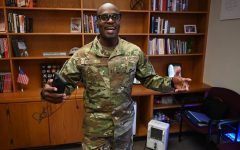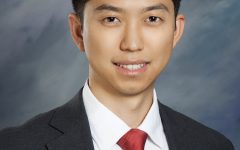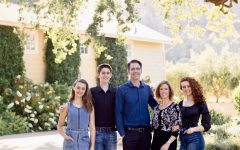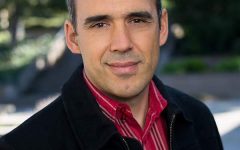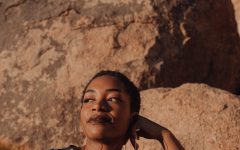Alumni Profile: Robert Quiroz, Born For Service
November 3, 2020 2023-12-14 15:39Alumni Profile: Robert Quiroz, Born For Service
By: Dana Negro
Robert Quiroz’s grandfather, Robert Moreno, served in the U.S. Army for 20 years; executing combat jumps in Korea with the infamous 187th Rakkasans, two tours in Vietnam, and was a purple heart recipient. Quiroz was named after him and knew at an early age he wanted to follow in his grandfather’s footsteps and serve his country. Just months after his grandfather passed away, Quiroz lost a close childhood friend to an IED in Afghanistan. As he grieved the loss of these two important people, he realized now was the time for him to take action. After a lot of prayer, Quiroz joined the California Army National Guard on March 29, 2011.
Quiroz knew of PUC but it was only while reading Fearless, by Eric Blehm, the biography of Adam Brown, a Navy SEAL who died in Afghanistan, that an idea began to form. The book mentions a young man from Angwin, Calif., and that caught Quiroz’s eye. The thought of completing a college degree was very appealing and it seemed like he was meant to be at PUC. Once he returned from military training, he and his wife moved to Angwin and began attending PUC.
Quiroz graduated from PUC with an associate’s degree in health sciences, ’16, and a bachelor’s degree in health communication, ’19, and spent this past year working as a staff member in the public relations office at PUC. Towards the beginning of the pandemic, Quiroz received a call from the National Guard informing him he would need to report for duty immediately. He left his wife and baby daughter and headed out to help serve his country and community during some of the greatest times of uncertainty. We talked with Quiroz to learn more about his experience serving on the front lines.
What kind of regular training do you have to do to be ready to serve at any time?
The National Guard is unique. We are dual purpose, meaning; we train for our units’ federal mission and our states mission in case we called in for a state emergency. Different units have different responsibilities and roles in case of an emergency, and it depends on your MOS or Military Occupation Specialty. My first is 88M or Motor Transportation. I joined a unit that was being deployed to do route clearance in Afghanistan. A job where you find IEDs and save lives. I transferred to that unit and became a 12 Bravo or Combat Engineer. That deployment didn’t end up happening so I switched my focus to our state mission and trained CERF-P which stands for Chemical, Biological Radiological, and High-Yield Explosive Emergency Response Force Package. It is a homeland response to a disaster, natural or man-made. The unit I was a part of was Search and Extraction. We trained to enter collapsed structures and rescue people. It was hard work, but we were able to train with Urban Search and Rescuer Task-4 firefighters from the Bay Area. It’s very important for the National Guard to work with other agencies because we augment their abilities. In the end, we are citizen soldiers and are a part of the community we serve.
You served while you were a student and a staff member at PUC. You are also married and have a young daughter. How do you juggle your responsibilities at home, in the classroom, and work with the potential to be called in to serve with little notice?
It was tough. Especially when I first started school at PUC. My unit was always training and sending me places during the quarter. I really had to make one-on-one connections with the faculty and explain my situation. Most were understanding and really helped me out! My commitments really made me learn to plan things out. I always knew I would be away at least one weekend a month and that was the week I really needed to get all my school word done. There were numerous times I was called away for duty and it interrupted school. Those connections with the professors really saved me.
It also helps to have a wonderful partner. My wife is amazing. It’s tough on her at times. The military has given so much to my family, but it takes time in return. I’ve missed birthdays, weddings, and special occasions. When I was deployed for a year, I missed everything! Even her graduating from PUC in 2017. That was tough. She is a champ and I am blessed to have her in my life.
This spring towards the beginning of the COVID-19 pandemic you were called in. Tell us about that.
It was chaotic at first. We had warnings that we may be called up. My unit first tapped eight people for a mission to support the Department of Public Health doing what they called “symptom screenings.” Our jobs were to screen the workers for any symptoms of COVID-19. If anyone showed symptoms, they were sent home. It was important because our locations were vital data gathering hubs that tracked resources and numbers relating to COVID-19 in the state of California. These were operating centers that couldn’t afford to be shut down, due to an outbreak, because lives depended on correct numbers to allocate resources according to the most severe areas. It was long days, but I felt like I was contributing to the fight. We were put up in hotels in Sacramento for two months. It was weird being the only people driving around since Sacramento was shut down. It was the longest time I had been separated from my daughter. I saw her twice during my activation. In the end, I was grateful to be home safe and COVID free.
Where were you sent?
I was sent to Rancho Cordova for a few weeks. Our mission was to conduct symptom screening for the Medical and Health Coordination Center in downtown Sacramento. This center received data concerning COVID-19 from health centers all over California. Eventually, they went remote and we were sent to do the same thing but at the 115th Task Force in Roseville. The 115th were responsible for coordinating California’s National Guard response. They were receiving their information from the California Office of Emergency Response. Again, it was a logistics hub that couldn’t afford an outbreak of COVID-19.
What were you responsible for doing?
I was part of the group of eight that our company activated. I was in charge of the seven. We conducted symptom screenings at three separate locations. My job, in addition to system screener, was Non-Commission Officer in Charge or NCOIC. I handled information flowing in and out of our group. On ESAD (Emergency State Active Duty) orders many things have to be tracked daily. Food, fuel used, gallons of fuel put into the vehicle, miles on vehicles, who has the day off, who is sleeping where, among many other things. All that information had to flow up to a central person (me) and then I had to push that information up the chain of command.
What was a typical day like?
At first, we would wake up at 4:50 a.m. to be on the road at 5: 25 a.m. Work started at 6 a.m. and went till 6 p.m. This was life for a while with no days off. During that time, we would put on some protective equipment and screen everybody who came in the MHCC.
Once I moved to Roseville the cycle changed. I worked two days and then had one off but the actual work was the same. I also gave one of my days off to some of my crew at another location who had no days off.
With degrees in health science and health communication, was there anything you learned in your classes or from professors at PUC that you were able to use while serving in the community?
I would actually like to thank professors Duncan, Vance, and Sung. Because of their classes, I was able to understand the various terms the personnel were using at the MHCC. My communication courses played a role in me better communicating with Army personnel. You really need to know how to approach people to effectively get your concerns understood. I was thrust into a unit where I knew nobody and only had one prior working relationship. In the end, we were part of a team, but it takes time to build that team relationship. The better you understand how to communicate across many levels and personalities the quicker you are absorbed into the team. Thank you to communication professors Rai and McGuire. Your knowledge helped in many different ways!
What has been the most memorable part of serving during the pandemic?
I would say the people I met. They were from parts of the California National Guard I never would have had the opportunity to meet before. I met many people from San Diego, LA, Bay Area, and Northern California. It was such a diverse group that all jumped at a moment’s notice when our state was in need. It was really cool to see everyone playing a part and contributing to the success of the overall mission of helping the state function. I also got to share a hotel room with one of my buddies from my deployment. We were roomies again!


